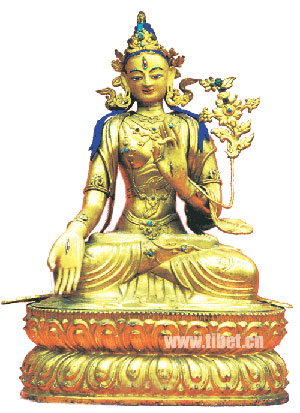Tibetan culture seen in White Tara sculpture
Among the thousands of artifacts on display at Shanghai Museum, there is a bronze sculpture of the White Tara from Tibetan Buddhism that gives a small glimpse into the rich culture of Tibet.
In Tibet Buddhism, the White Tara is an important bodhisattva, which is defined as a person who is able to reach nirvana but delays doing so out of compassion in order to save suffering beings.
|
|
|
File photo shows a gilded bronze sculpture of the White Tara. [Photo: tibet.cn] |
It is said that the White Tara is very kind and knows everything in the world. Thus people pray to her asking for help.
The White Tara has seven eyes and is also called the seven-eye Buddha. The eyes symbolize that she sees every creature in the world. White Tara worshippers believe they can avoid diseases and disasters, live a long life and that their wishes will come true.
In Tibet there are 21 Taras -- the White Tara is one -- and legend says that one will appear when one of eight types of danger occur. The eight dangers are: lions and pride, wild elephants and delusions, forest fires and hatred, snakes and envy, robbers and fanatical views, prisons and avarice, floods and lust, demons and doubts.
By worshipping a Tara, people hope for help when encountering dangerous situations in their lives.
The White Tara sculpture on display at Shanghai Museum was made during the Qing Dynasty (1644-1911) and includes a gold trim that gives it a precious look.
Leisurely perched on a lotus foundation, the White Tara is looking down with a subtle smile on her face, enhancing her gentle and merciful look.
The delicate and intricate carving gives an indication of the excellent craftsmanship that went into making it. The body of the sculpture is lively and the bodhisattva's seven eyes are visible, just like the legend.
 0
0 







